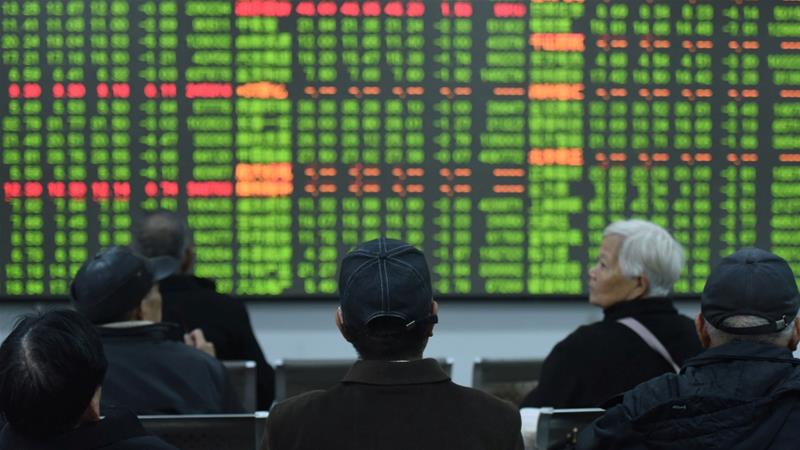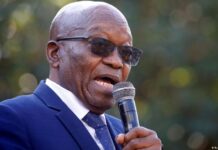Investors in Asia cheered China’s announcement that it would halve tariffs on
Asian stocks rallied on Thursday afternoon after China announced that it would halve tariffs on $75bn goods and services from the United States.
Japanese shares posted their biggest one-day gain in more than a year on Thursday as the benchmark Nikkei jumped 24 percent, its most since late December 2018.
MSCI’s broadest index of Asia-Pacific shares outside Japan jumped 1.66 percent and mainland Chinese shares also reacted positively, with the bluechip CSI300 index up 1.97 percent.
China said on Thursday it will halve tariffs on some US goods, which could help improve negotiating conditions for a second phase of trade deal after the two countries signed off on a interim deal last month.
Overnight on Wall Street, the mood was brighter as the S&P 500 gained 1.13 percent to a record close of 3,334.69 while the Nasdaq Composite added 0.43 percent to 9,508.68, also a record high.
The United States ADP National Employment Report showed private payrolls jumped 291,000 jobs in January, the most since May 2015, while a separate report showed US services sector activity picked up last month. Both indicators suggest the economy could continue to grow this year even as consumer spending slows.
Traders also cited vague rumours of a possible vaccine or a drug breakthrough for the coronavirus as a trigger for Wednesday’s stock rally, although they also said such catalysts were likely to simply be an excuse for short-covering.
The World Health Organization played down media reports on Wednesday of “breakthrough” drugs being discovered to treat people infected with the new coronavirus.
Another 73 people on the Chinese mainland died on Wednesday from the virus, the highest daily increase so far, bringing the total death toll to 563, the country’s health authority said on Thursday.
“Despite all the efforts by the Communist Party, the virus is becoming a major global disaster. Considering workers usually start to return to hometown about a week before the Lunar New Year, many patients must have left Wuhan before its lockdown on January 23,” TS China Research’s Tashiro said.
Statistics from China indicate that about 2 percent of people infected with the new virus have died, suggesting it may be deadlier than seasonal flu but less deadly than SARS, another reason investors remained relatively calm.
“The coronavirus is continuing to spread so we need to remain cautious. But markets now appear to think that there will be a quick economic recovery after a short-term slump,” said Masahiro Ichikawa, senior strategist at Sumitomo Mitsui DS Asset Management.
The 10-year US Treasuries yield rose back to 1.654 percent from a five-month low of 1.503 percent set last Friday.
In the currency market, the safe-haven Swiss franc and the yen retreated.
The franc eased to 0.9738 franc per dollar, having lost 0.4 percent on Wednesday.
The yen stepped back to 109.98 yen, compared with a three-week high of 108.305 hit on Friday.
The euro stood flat at $1.0998, having shed 0.4 percent in the previous session.
In commodities, US West Texas Intermediate (WTI) crude oil gained 2.17 percent to $51.85 per barrel, extending its rebound from a 13-month low of $49.31 touched on Tuesday.
Still it is down about 15 percent so far this year.
Copper, considered a good gauge on the health of the global economy because of its wide industrial use, showed some signs of stabilisation although it remained depressed overall.
Shanghai copper extended its rebound into the third day, rising 1 percent from 33-month low hit earlier this week. It is about 5 percent below its levels just before the start of Lunar New Year holidays.
“One has to wonder whether China can meet its trade agreement with the US to increase imports by $200bn, which looked very difficult to begin with,” said a manager at a US asset management firm, who declined to be named because he is not authorised to speak about China.
“Before the outbreak, a mini goldilocks market was everyone’s consensus. But we have to see whether we need to change such a view,” he added.













![Hotstar Premium Cookies 2019 [*100% Working & Daily Updated*] Hotstar Premium Cookies 2019 [*100% Working & Daily Updated*]](https://tahav.com/wp-content/uploads/2019/11/Hotstar-Premium-Cookies-Free-100x70.jpg)



